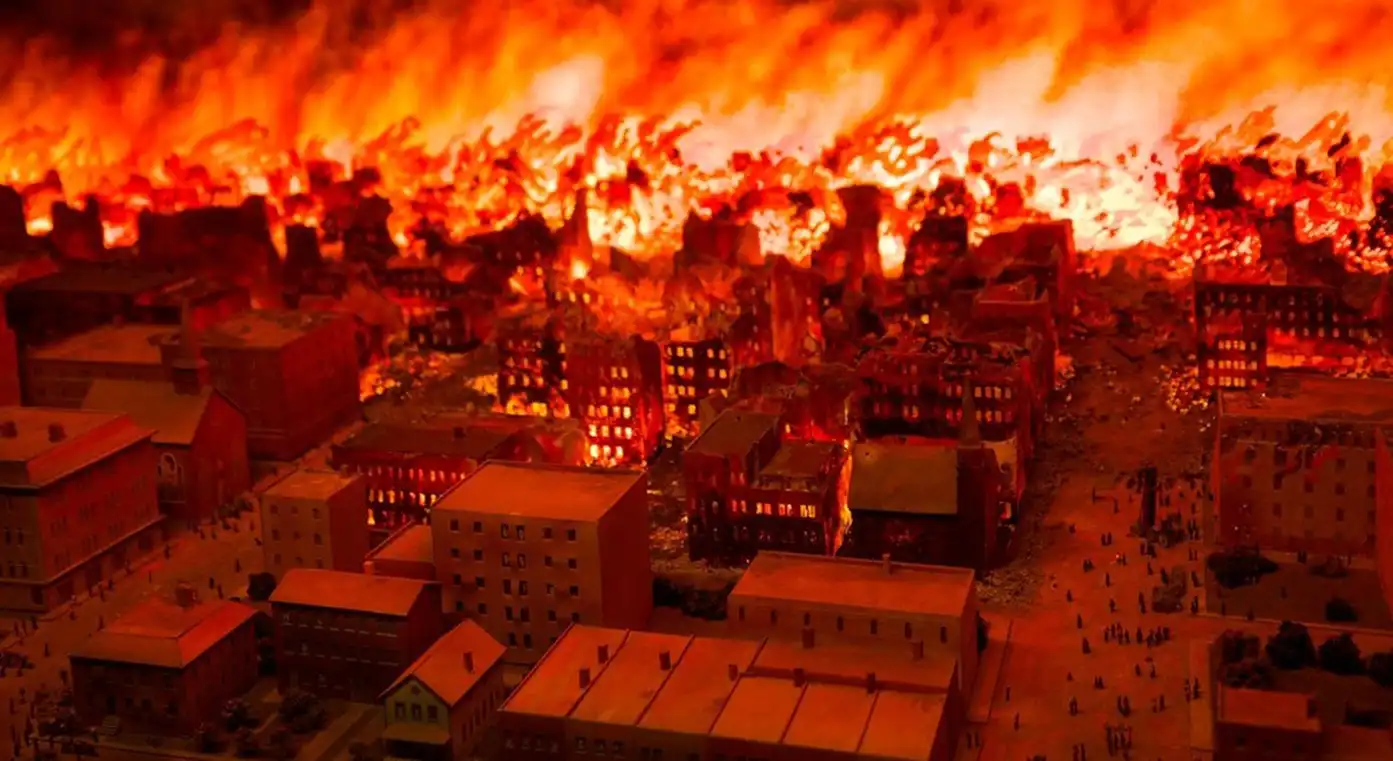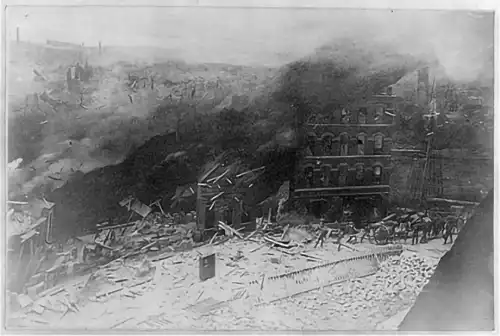
The Great Chicago Fire broke out in October 1871. It raged for two dark days, and destroyed much of the city. It didn’t spare the building that housed Cook County’s deed records. It also burned up many original records stored in Chicago homes.
The Chicago Tribune has said that the destruction and re-creation of property deeds in Chicago holds “lessons for the future.” That is, the post-fire deed history has something to say to county recorders destined to lose records because of the breakdown of microfilm, or through hacks, or in flooding events.
Property Owners’ Official Proof Disappears
Soon after the Great Fire, a Chicago Times editorial observed:
There has been absolute destruction of all legal evidence of titles to property in Cook County. The annoyance, calamity and actual distress that will arise from this misfortune are not yet properly appreciated.
The county saved what it could. Today, the Cook County Court Archives has a section known as the “burnt records.” These are the hundreds of remnants from a scramble to prove property ownership.
One Chicago home belonged to the heirs of a certain survivor of the Battle of Waterloo, Andreas von Zirngibl. The von Zirngibl family said that their deed, adorned with a red seal and stored in a box of important papers, was lost to the Great Chicago Fire. We’ll get back to the von Zirngibl property momentarily.
Private Companies Save Records

The abstract firms existing at the time were Chase Brothers and Co.; Shortall and Hoard; and Jones and Sellers. Employees of these companies grabbed their records. John Shortall pointed a gun at a wagon and forced its driver to whisk the company’s deeds out of danger.
And the J.H. Rees company managed to save copies of all the Cook County maps and plats.
Given that the official land records were gone, could these substitute for the government copies? The Chicago Times editorial proposed that they become the new government records.
“Burnt Records Act” Formally Approves the Replacement Deeds
Eventually, the record companies combined their books. They had saved decades worth of abstracts of real estate conveyances. And they came together to reconstruct the city’s title history. As the companies consolidated their records, the title business in Chicago completely transformed itself. Today’s Chicago Title Insurance Company emerged from the abstract companies firms that preserved their records through the time of that infamous fire.
In 1872, the existing abstract of title records became official and admissible in court, when Illinois enacted the Burnt Records Act.
For the first month after the fire, real estate companies found themselves in a complete shutdown. After that, Chicago rebuilt its businesses and homes with phenomenal speed. The Burnt Records Act was pivotal in the restoration of the city. Indeed, the restoration and the land transactions were going on even before the law could catch up.
But many deeds, particularly to homes, would never be recovered or replicated.
The Family von Zirngibl Goes to Court for the Deed
Andreas von Zirngibl, an amputee who famously fought Napoleon, bought the land 16 years before the Great Chicago Fire, his descendants recall. He acquired the deed after coming to the United States from Bavaria.
Von Zirngibl’s spouse, Monica, told a court that being buried on his property was his dying wish. And so the family created a gravesite and buried him there.
To mark and protect the spot, family members say, the von Zirngibl children put a picket fence around the site, on the swampy land off Weing Avenue near the bank of the Calumet River.
After the fire, the family faced a question that has haunted them ever since. How could they prove that the land beside the river bank belonged to them?
The von Zirngibls pursued legal remedies from the Illinois courts. Judges can issue a quiet titledecision if they determine a deed needs to be restored to a particular party. The family stuck with their case for years, until they finally got the Illinois Supreme Court to hear their pleas. But alas…
Pain of the Heirs Who Say Their Land Was Taken by the Fire
Supposedly Andreas von Zirngibl paid less than $200 for the land back in the day. The Illinois Supreme Court determined that it had appreciated dramatically. The land was valued at around a million dollars when the court heard the case.
The family persevered as far as possible. Or at least a few of them did. One of the von Zirngibl heirs remembers arguments within the family. Some of the heirs were keener on pursuing the case than others.
In the end, no one in the family ever got their hoped-for relief. After all, the Illinois courts had encountered plenty of people who’d squatted on properties until somebody’s legal action uprooted them. Without a recorded chain of title, it can be impossible to tell whether a claim to land is valid.
And, more to the point in litigation, the Calumet and Chicago Dock Company made a competing claim to the property.
In the year 1894, the highest court in the state determined that Andreas von Zirngibl’s descendants had a recognizable claim to the spot around von Zirngibl’s grave only — not the whole parcel.
To this day, members of the family line believe they were unfairly stripped of their property.
The Upshot: What Chicago’s Lawmakers Did for Deeds
The Burnt Records Act has a different name today. It’s called the Destroyed Public Records Act. Its superpower was the precedent it set. The law enabled private records showing deed transfers and other official transactions to be deemed official while a county worked on creating a replacement for a damaged trove of public records.
Even now, fire can destroy papers. Computer hackers can sometimes wreak havoc with digitized records. Proof of transactions would need to come from sources other than the county offices. The rebuilding of Chicago after the fire shows how a great city adapted to new realities.
As for the von Zirngibls, what’s the story with their little plot? Four decades ago the Southeast Chicago Historical Society helped them fundraise to replace and protect the gravestone. Nevertheless, the stone was hit and broken into pieces by a crane in 1999. Not pleasant news for the long-suffering descendants of the Napoleon fighter.
At least the contractors’ company paid for restoration costs.
Supporting References
Chicago Title Insurance Company (Fidelity National Financial): Chicago Title and Trust Co., 160 Years and Beyond – Upon These Records a New Chicago Stands.
Sarah Freishtat and Talia Soglin for the Chicago Tribune, via ChicagoTribune.com: Scores of Chicago Property Records Burned in the Great Fire of 1871 – Their Destruction and Re-creation Might Hold Lessons for the Future (Sep. 30, 2021; citing historical news reports, and Rod Sellers, director of the Southeast Chicago Historical Museum, as well as Carl Smith, author of Chicago’s Great Fire: The Destruction and Resurrection of an Iconic American City).
And as linked.
More on topics: Understanding the chain of title in real estate law, Untangling titles passed down without legal records
Image credits: Marcin Wichary via Flickr, licensed under CC BY-SA 2.0 Generic; and GM Watson (Public Domain) via Picryl.
